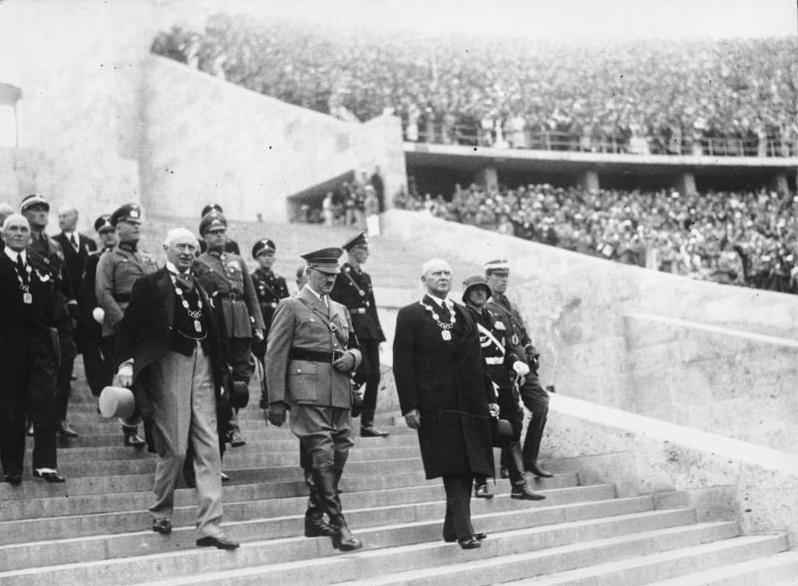I once saw an interview with basketball player Charles Barkley, in which he discussed his retirement. Barkley was a Hall of Fame player, and like most of those guys, he hung on a few seasons too long. Even having lost a step or three, Sir Charles was still a decent player, but that’s all he was — a decent player, but getting paid like a superstar and with a superstar’s reputation. A few seasons after retiring, he admitted as much. He said something like (from memory) “I’d guard a guy and think, ‘this is going to be easy, this guy is terrible’. And then he’d beat me, and I’d realize I just got beat by some guy who’s terrible, and then I knew it was time to hang it up.”
One thing chicks of both sexes and all however-many-we’re-up-to genders don’t realize these days is how competitive men — actual biological males — are hardwired to be. Things like World of Warcraft and fantasy football only exist because the genius who invented those figured out a way to tap into that heretofore-unexpressed male competitiveness. And indeed, it’s the guy who’d never even dream of putting on shoulder pads who’s the most insanely competitive guy in a fantasy football league or (I’m certain) a whatever-they’re-called in World of Warcraft. Even the uber-dorks in the Math Club and the Speech and Debate Society went after each other like Mickey Ward and Arturo Gatti. It’s just how guys are … or, at least, how guys used to be.
[…]
When it comes right down to it, that’s why men of a certain age simply don’t get “women’s sports”. Few will be as crustily chauvinistic as yer ‘umble narrator, and come right out and say it, but here goes: Women’s “sports” are just a shoddy knockoff of the real thing, because women just aren’t wired that way. That’s not to say that there aren’t competitive women, or athletic women — obviously there are, some very athletic and very competitive — but the female of the species just isn’t wired to put in the work the way males are. When faced with the prospect of three straight hours in the batting cage, swinging at curve after curve until your blisters have blisters and your shoulders feel like they’re falling out of their sockets, most women will quite sensibly ask “why bother?” Competition-for-competition’s-sake, even when it’s only against yourself in those long, long, looooong hours in the cage, just doesn’t motivate them the way it does us.
Which is why a person’s reaction to Simone Biles, or the USA Women’s soccer team, or the WNBA, or what have you is an almost perfect predictor of their age, not just their “gender”. I judge sports as sports. I don’t care about soccer, but if I did, I’d care about it as soccer — meaning, I’d want to see the best possible players, playing at the highest possible level. Women’s Olympic teams — that is to say, all star teams, the very best players — routinely get smoked by teams of 15 year old boys. Sir Charles is pushing sixty, but he could dominate the WNBA right now, in street clothes. Obviously this doesn’t apply to Pee Wee or rec leagues, but if you’re going to take a paycheck for doing it, then I want to see exactly what I paid for.
In estrogen-drenched, synchronized-ovulation Clown World, it’s all about appearances. Sure, she let her team down and wussed out (while still talking up how great she is), but can’t you see that it gave her the sadz? Sure, Megan Rapinoe et al keep getting smoked by 14 year old boys, then choking in international competition, but can’t you see her out there, with her pink hair and her tats and her Strong, Confident Empowerment? The “competition”, such as it is, is an excuse for the display. Michael Jordan ought to give baseball another shot. We know he can cry. These days, that’d get him a first-class ticket to Cooperstown.
Severian, “On Competition”, Rotten Chestnuts, 2021-08-02.
October 8, 2024
QotD: The competitive instinct
August 6, 2024
QotD: Malicious idiocy
God made not men to be malicious idiots. This is something we achieved entirely on our own. It is a living testament to Free Will; and those who attribute malice to the Devil may be too humble. We study his suggestions and run with them. True, he may have started it in scrimmage, but only a human can take it, as we say, “the full nine yards.”
Perhaps we should make it an Olympic event, with male, female, and trans competitions. It would be more fair than the other competitions for running, jumping, lifting weights, &c. No single country would dominate the sport, at least to begin with; some of the smallest nations could excel. Or if they didn’t, malicious idiots could charge the field, accusing judges and timekeepers of racism and hate crimes, adding to the loathely spectacle: Citius! Altius! Fortius!
David Warren, “Off & running”, Essays in Idleness, 2019-11-22.
[NR: This QotD has become much more timely than it was when I scheduled it for today a few months ago.]
August 2, 2024
46-second beatdown in Paris – Olympic hypocrisy on full, disgusting display
On the social media site formerly known as Twitter, ESR reacts to the Olympic boxing travesty of a male boxer being in the ring with a female boxer:
I have mixed feelings about the beatdown of Angela Carini at the Olympics and the feminists complaining that she should never have been put in the ring with a biological male.
On the one hand, yes, it’s disgusting that a man pretending to be a woman battered Carini to the point where she threw the match in justified fear of being killed in the ring.
On the other hand, this travesty seems like such an obvious consequence of feminist doctrine and the feminization of politics that I think most of the women (and “male feminist” allies) decrying it should shut the hell up until they seriously rethink their premises.
It wasn’t “the patriarchy” or defenders of traditional gender roles pushing for this. It was a consequence of decades of insistence that men and women are interchangeable, that gender roles are “socially constructed” – mutable at whim, and that people’s feelings about their own victimization and self-assigned identity trump objective facts.
Feminism and political correctness put Carini’s face in the path of Imane Kelif’s fists. It’s the same ideological cluster that has led to an epidemic of rapes by biological males in women’s prisons and homeless shelters.
Most women – and far too many weak-kneed men – said nothing for decades as this fantasy ideology of feelz laid waste to our cultural norms. And in news that I’m completely sure is utterly unrelated, over 50% of young women identifying as “liberal” have a diagnosed mental disorder.
Maybe, just maybe, feminists and postmodernists and critical theorists ought to stop punching Angela Carini’s face?
July 29, 2024
“Queering” the Olympics
The 2024 Summer Olympic Games in Paris have started, with the traditional “fuck you!” to those the elites most disdain, who in this case are apparently the more than two billion Christians around the globe:
At Spiked, Brendan O’Neill notes that our kakistocratic elites are still not tired of “queering” everything they possibly can, especially if it gets up the noses of those disgusting dirt people in the provinces:
Is anyone else bored of “queering”? Everything’s getting “queered” these days. We’ve had “Queering the Curriculum“. “Queering the Arts“. And my personal favourite: “Queering Palestine“. This entails academics “unpack[ing] the multiple intersections of queer politics and the Palestinian struggle”. Hot tip for these profs: if Hamas ever invites you to discuss your theories, don’t agree to meet them on the high floor of a building. “Queering the Pavement” is the only thing they’re interested in.
Now, with soul-zapping inevitability, we’ve had the “queering” of the Olympic Games. Yesterday’s rain-sodden opening ceremony in Paris was super LGBTQIAzzz. There were drag acts everywhere. A bearded bloke twerked for the world. A bollock-naked man in blue paint was served on a platter of fruit to a gaggle of diet-dodging drag queens. Look, if I wanted to be exposed to the camp debauchery of drag culture, I’d go to a kindergarten.
It really was a naff, dispiriting affair. It was the first opening ceremony to take place, not in a stadium, but in the heart of the hosting city. Boat after boat after boat carried the Games’ athletes along the Seine as 300,000 spectators in soaked plastic macs craned their necks for a glimpse. It seemed to go on forever. It was so bad that even square liberals on X started using the favoured slogan of the right: “STOP THE BOATS”.
The weather didn’t help. The lashing rain hampered the audio, making it hard to hear the ceremony’s star turns, Celine Dion and Lady Gaga (an upside of the downpour, I suppose). What we could hear was just weird. Like when a headless Marie Antoinette sang the opening bars to an ear-splitting heavy-metal ditty. The ceremony organiser, Thomas Jolly, said he wanted his spectacle to be a “celebration of being alive” – here we had a celebration of being dead.
Then there was the “queering”. Just as you can’t switch on the BBC, visit a library or have a quiet pray these days without encountering a drag queen, so you can’t watch the opening ceremony of the Olympics without seeing portly men in moob-hugging outfits voguing and gloating. It was more Eurovision than Olympian. More Ru Paul than Ancient Greece. More “Sashay away” than “Citius, Altius, Fortius“. That’s the original Olympic motto. It means “Faster, higher, stronger”. Because, believe it or not, we were once a species that celebrated the moral beauty of sporting heroism rather than the ability of a middle-aged man to lard himself into a sequined gown.
The part of the ceremony that caused the biggest stink was the camp Last Supper. A bunch of drag acts gathered around a buxom woman adorned in an aureole halo crown in an unmistakable mimicking of da Vinci’s painting of Christ and the apostles at their final meal. Wearing the smug look of all glib performance artists who love nothing more than to piss off “normies” – because they lack the talent for anything else – the drag queens giddily got into their disciple positions and heaped holy adoration on the lady Jesus. You could almost hear their thoughts: “Ooh boy, this is going to piss off old farts – yes!”
July 5, 2024
History Summarized: The Greek Age of Cities
Overly Sarcastic Productions
Published Mar 15, 2024Ancient Greece created a social ecosystem of numerous independent cities to cater to my tastes specifically.
SOURCES & Further Reading:
The Greeks: A Global History by Roderick Beaton, 2021
The Greeks: An Illustrated History by Diane Cline, 2016
Men of Bronze: Hoplite Warfare in Ancient Greece by Donald Kagan & Gregory F. Viggiano, 2013
“Revolution” & “Tyranny” from Ancient Greek Civilization by Jeremy McInerney
“Dark Age and Archaic Greece” from The Foundations of Western Civilization by Thomas F. X. Noble
“Dark Age and Archaic Greece” & “The Greek Way of Waging War” & “Greek Language, Literacy, and Writing” from The Greek World: A Study of History and Culture by Robert Garland
I also have a degree in Classical Studies
(more…)
June 27, 2024
Tim Worstall offers a rule-of-thumb for physical fitness
Rather than digging deeply into the esoterica of current research on the human body, Tim Worstall suggests there’s a handy rough metric you can use to judge your own physical fitness in any given area that sounds helpful:

“Exercise Running Fitness Physical Activity – Credit to https://homethods.com/” by homethods is licensed under CC BY 2.0 .
If you can do the whatever it is in under twice the Olympic time for it then that’s just fine. You may, at that point, step off the treadmill and go get more dip.
Not that I have any expertise in such things as fitness — just the normal amount of forced labour true of anyone who went through public school. It still seems to me to be a good guide.
True, the accuracy of this varies depending upon the specific activity. Managing 100 metres in 20 seconds is not a huge call — only just managing it would have small children jeering perhaps. But a mile in 8 minutes, yes, that does require a certain level of fitness and one that’s also indicative of, well, being at a certain level of fitness. Not that I’m going to do anything so gauche as check this, but that sounds like about the fitness tests for middle aged men in the military (longer if it’s in full kit).
One recent Tour de France time trial was around the 45 km mark. Which they did in 45 to 49 minutes (again, from memory) and doing 45 km in 90 minutes is something the average club cyclist would do on Granny’s bike, with the basket in front. A professional cyclist would need to add a sheepdog to the basket to be that slow. But being able to crank out 45 km on a bike — in that hour and a half — is showing a level of fitness that I take to be just fine for the average couch lizard.
So too the mile swim. Olympic swimming is 1500m, in 14 minutes or so. So, a mile in half an hour? That looks quite testing but if I can get close to that (in my 60s) then I’m happy. I can swim a mile, which in itself is a reasonable level of fitness, but that time would, I think, qualify as being “fit enough”.
It’s possibly true that this guide is more accurate at the longer distances. For being able to even perform the longer distances is itself a guide to fitness and the time recorded is less of an issue. It would also be possible that personal experience is playing a part here — I’ve always been comparatively better at longer. Few fast twitch fibre. So the “Worstall’s” could well be “As applies to Worstall” rather than something more general.
I’ve always been bad at endurance sports, but I’ve done fairly well in sprint-style, “twitchy” sports where you need fast reactions rather than long, slow-burn exertion. Tim’s rule of thumb seems to be more useful for runners, swimmers, etc., than for badminton players or fencers.
June 11, 2024
QotD: Mandatory fun
Mandatory, government-sponsored fun has been on the European Left’s agenda practically since the Estates General. All of that stuff — hiking clubs, guitar clubs, model this-and-that clubs — falls under “building Socialism”, and the idea is either to totally replace a community’s organic ties with State-mandated bonds, or to restore a community’s organic ties via State-mandated bonds, depending on whether the “Socialism” you’re building is of the Soviet or Nazi variety.
The Soviets, at least, went so far as to organize an entire massive government bureaucracy around the idea of Proletkult, which aimed at replacing “bourgeois” art wholesale with the “proletarian” version. You’re free to slog through the novels of guys like Maxim Gorky to see if it worked or not; for now I’ll simply note that the first head of Proletkult, Anatoly Lunacharsky, officially carried the title “Enlightenment Commissar”. […]
The other way the European Left built socialism was with sports, of course, and though it will never happen under the current dispensation, I’d love to read a solid academic history of the USSR’s Olympic teams. Viktor Suvorov (of the famous “Suvorov Thesis” of the Ostfront) insisted that pretty much all Soviet travel teams were comprised entirely of Spetsnaz commandos, and while I don’t doubt this is largely true, there were, on the other hand, “military” teams that were almost entirely civilian. To take one famous example, NHL legend Sergei Fedorov came up with CSKA Moscow, which — for some mysterious reason — you have to dig a bit to learn was the official Red Army hockey team. As in, Fedorov — though only sixteen — was in the Soviet Army, specifically to play hockey, and he wasn’t the only one. There was such a thing as “pro” hockey in the USSR, and it was very popular, but all the best “pros” played for Armed Forces teams, because anyone good enough at hockey to go “pro” would find himself drafted …
Severian, “Marx Was Right After All (an ongoing series)”, Rotten Chestnuts, 2021-01-12.
August 7, 2023
QotD: How do we determine Roman dates like “46 BC”?
So this is actually a really interesting question that we need to break into two parts: what do historians do with dates that are at least premised on the Roman calendar and then what do we do with dates that aren’t.
Now the Roman calendar is itself kind of a moving target, so we can start with a brief history of that. At some very early point the Romans seem to have had a calendar with ten months, with December as the last month, March as the first month and no January or February. That said while you will hear a lot of folk history crediting Julius Caesar with the creation of two extra months (July and August) that’s not right; those months (called Quintilis and Sextilis) were already on the calendar. By the time we can see the Roman calendar, it has twelve months of variable lengths (355 days total) with an “intercalary month” inserted every other year to “reset” the calendar to the seasons. That calendar, which still started in March (sitting where it does, seasonally, as it does for us), the Romans attributed to the legendary-probably-not-a-real-person King Numa, which means in any case even by the Middle Republic it was so old no one knew when it started (Plut. Numa 18; Liv 1.19.6-7). The shift from March to January as the first month in turn happens in 153 (Liv. Per. 47.13), probably for political reasons.
We still use this calendar (more or less) and that introduces some significant oddities in the reckoning of dates that are recorded by the Roman calendar. See, because the length of the year (355 days) did not match the length of a solar year (famously 365 days and change), the months “drifted” over the calendar a little bit; during the first century BC when things were so chaotic that intercalary months were missed, the days might drift a lot. This problem is what Julius Caesar fixed, creating a 365 day calendar in 46; to “reset” the year for his new calendar he then extended the year 46 to 445 days. And you might think, “my goodness, that means we’d have to convert every pre-45 BC date to figure out what it actually is, how do we do that?”
And the answer is: we don’t. Instead, all of the oddities of the Roman calendar remain baked into our calendar and the year 46 BC is still reckoned as being 445 days long and thus the longest ever year. Consequently earlier Roman dates are directly convertible into our calendar system, though if you care what season a day happened, you might need to do some calculating (but not usually because the drift isn’t usually extreme). But in expressing the date as a day, the fact that the Gregorian calendar does not retroactively change the days of the Julian calendar, which also did not retroactively change the days of the older Roman calendar means that no change is necessary.
Ok, but then what year is it? Well, the Romans counted years two ways. The more common way was to refer to consular years, “In the year of the consulship of X and Y.” Thus the Battle of Cannae happened, “in the year of the consulship of Varro and Paullus,” 216 BC. In the empire, you sometimes also see events referenced by the year of a given emperor. Conveniently for us, we can reconstruct a complete list of all of the consular years and we know all of the emperors, so back-converting a date rendered like this is fairly easy. More rarely, the Romans might date with an absolute chronology, ab urbe condita (AUC) – “from the founding of the city”, which they imagined to have happened in in 753 BC. Since we know that date, this also is a fairly easy conversion.
Non-Roman dates get harder. The Greeks tend to date things either by serving magistrates (especially the Athenian “eponymous archon”, because we have so many Athenian authors) or by Olympiads. Olympiad dates are not too bad; it’s a four-year cycle starting in 780 BC, so we are now in the 700th Olympiad. Archon dates are tougher for two reasons. First, unlike Roman consuls, we have only a mostly complete list of Athenian archons, with some significant gaps. Both dates suffer from the complication that they do not line up neatly with the start of the Roman year. Olympiads begin and end in midsummer and archon years ran from July to June. If we have a day, or even a month attached to one of these dates, converting to a modern Gregorian calendar date isn’t too bad. But if, as is often the case, all you have is a year, it gets tricky; an event taking place “in the Archonship of Cleocritus” (with no further elaboration) could have happened in 413 or 412. Consequently, you’ll see the date (if there is no month or season indicator that lets us narrow it down), written as 413/2 – that doesn’t mean “in the year two-hundred and six and a half” but rather “413 OR 412”.
That said, with a complete list of emperors, consuls and Olympiads, along with a nearly complete list of archons, keeping the system together is relatively easy. Things get sticky fast when moving to societies using regnal years for which we do not have complete or reliable king’s lists. So for instance there are a range of potential chronologies for the Middle Bronze Age in Mesopotamia. I have no great expertise into how these chronologies are calculated; I was taught with the “Middle” chronology as the consensus position and so I use that and aim just to be consistent. Bronze Age Egyptian chronology has similar disputes, but with a lot less variation in potential dates. Unfortunately while obviously I have to be aware of these chronology disputes, I don’t really have the expertise to explain them – we’d have to get an Egyptologist or Assyriologist (for odd path-dependent reasons, scholars that study ancient Mesopotamia, including places and cultures that were not Assyria-proper are still called Assyriologists, although to be fair the whole region (including Egypt!) was all Assyria at one point) to write a guest post to untangle all of that.
That said in most cases all of this work has largely been done and so it is a relatively rare occurrence that I need to actually back convert a date myself. It does happen sometimes, mostly when I’m moving through Livy and have lost track of what year it is and need to get a date, in which case I generally page back to find the last set of consular elections and then check the list of consuls to determine the date.
Bret Devereaux, “Referenda ad Senatum: January 13, 2023: Roman Traditionalism, Ancient Dates and Imperial Spies”, A Collection of Unmitigated Pedantry, 2023-01-13.
August 3, 2022
QotD: Relative wealth among the Spartiates
… economic inequality among the spartiates was not new at any point we can see. But the nature of all of our sources – Plutarch, Xenophon, etc – is that they are almost always more interested in describing the ideal Spartan polity than the one that actually existed. And I want to emphasize […] that this ideal policy does not seem to ever have existed, with one author after another placing that ideal Sparta in the time period of the next author, who in turn informs us that, no, the ideal was even further back.
It is important to begin by noting that the sheer quantity of food the spartiates were to receive from their kleros would make almost any spartiate wealthy by the standards of most Greek poleis – spartiates, after all, lived a live of leisure (Plut. Lyc. 24.2) supported by the labor of slaves (Plut. Lyc. 24.3), where the closest they got to actual productive work was essentially sport hunting (Xen. Lac. 4.7). If the diet of the syssition was not necessarily extravagant, it was also hardly … well, Spartan – every meal seems to have included meat or at least meat-broth (Plut. Lyc. 12.2; Xen. Lac. 5.3), which would have been a fine luxury for most poorer Greeks. So when we are talking about disparities among the spartiates, we really mean disparities between the super-rich and the merely affluent. As we’ll see, even among the spartiates, these distinctions were made to matter sharply and with systematic callousness.
Now, our sources do insist that the Spartan system offered the Spartiates little opportunity for the accumulation or spending of wealth, except […] they also say this about a system they admit no longer functions … and then subsequently describe the behavior of wealthy Spartans in their own day. We’ve already noted Herodotus reporting long-standing wealthy elite spartiates as early as 480 (Hdt. 7.134), so it’s no use arguing they didn’t exist. Which raises the question: what does a rich Spartiate spend their wealth on?
In some ways, much the same as other Greek aristocrats. They might spend it on food: Xenophon notes that rich spartiates in his own day embellished the meals of their syssitia by substituting nice wheat bread in place of the more common (and less tasty) barley bread, as well as contributing more meat and such from hunting (Xen. Lac. 5.3). While the syssitia ought to even this effect out, in practice it seems like rich spartiates sought out the company of other rich spartiates (that certainly seems to be the marriage pattern, note Plut. Lys. 30.5, Agis. 5.1-4). Some spartiates, Xenophon notes, hoarded gold and silver (Xen Lac. 14.3; cf. Plut. Lyc. 30.1 where this is supposedly illegal – perhaps only for the insufficiently politically connected?). Rich spartiates might also travel and even live abroad in luxury (Xen. Lac. 14.4; Cf. Plut. Lyc. 27.3).
Wealthy spartiates also seemed to love their horses (Xen. Ages. 9.6). They competed frequently in the Olympic games, especially in chariot-racing. I should note just how expensive such an effort was. Competing in the Olympics at all was the preserve of the wealthy in Greece, because building up physical fitness required a lot of calories and a lot of protein in a society where meat was quite expensive. But to then add raising horses to the list – that is very expensive indeed (note also spartiate cavalry, Plut. Lyc. 23.1-2). Sparta’s most distinguished Olympic sport was also by far the most expensive one: the four-horse chariot race.
In other ways, however, the spartiates were quite unlike other Greek aristocrats. They do not seem to have patronized artists and craftsmen. The various craft-arts – decorative metalworking, sculpture, etc – largely fade away in Sparta starting around 550 B.C. – it may be that this transition is the correct date for the true beginning of not only “Spartan austerity” but also the Spartan system as we know it. There are a few exceptions – Cartledge (1979) notes black-painted Laconian finewares persist into the fifth century. Nevertheless, the late date for the archaeological indicators of Spartan austerity is striking, as it suggests that the society the spartiates of the early 300s believed to have dated back to Lycurgus in the 820s may well only have dated back to the 550s.
The other thing we see far less of in Sparta is euergitism – the patronage of the polis itself by wealthy families as a way of burnishing their standing in society. While there are notable exceptions (note Pritchard, Public Spending and Democracy in Classical Athens (2015) on the interaction and scale of tribute, taxes and euergitism at Athens), most of the grand buildings and public artwork in Greek cities was either built or maintained by private citizens, either as voluntary acts of public beneficence (euergitism – literally “doing good”) or as obligations set on the wealthy (called liturgies). Sparta had almost none of this public building in the Classical period – Thucydides’ observation that an observer looking only at the foundation of Sparta’s temples and public buildings would be hard-pressed to say the place was anything special is quite accurate (Thuc. 1.10.2). There are a handful of exceptions – the Persian stoa, a few statue groups, some hero reliefs, but far, far less than other Greek cities. In short, while other Greek elites felt the need – or were compelled – to contribute some of their wealth back to the community, the spartiates did not.
Passing judgment on those priorities, to a degree, comes down to taste. It is easy to cast the public building and patronage of the arts that most Greek elites engaged in as crass self-aggrandizement, wasting their money on burnishing their own image, rather than actually helping anyone except by accident. And there is truth to that idea – the Greek imagination has little space for what we today would call a philanthropist. On the other hand – as we’ll see – a handful of spartiates will come to possess a far greater proportion of the wealth and productive capacity of their society. Those wealthy spartiates will do even less to improve the lives of anyone – even their fellow spartiates. Moreover, following the beginning of Spartan austerity in the 550s, Sparta will produce no great artwork, no advances in architecture, no great works of literature – nothing to push the bounds of human achievement, to raise the human spirit.
Bret Devereaux, “Collections: This. Isn’t. Sparta. Part IV: Spartan Wealth”, A Collection of Unmitigated Pedantry, 2019-08-29.
June 10, 2022
Ancient Greek Olives – Gifts from A Goddess
Tasting History with Max Miller
Published 1 Jun 2021Help Support the Channel with Patreon: https://www.patreon.com/tastinghistory
Tasting History Merchandise: crowdmade.com/collections/tastinghistoryFollow Tasting History here:
Instagram: https://www.instagram.com/tastinghist…
Twitter: https://twitter.com/TastingHistory1
Tiktok: TastingHistory
Reddit: r/TastingHistory
Discord: https://discord.gg/d7nbEpyTasting History’s Amazon Wish List: https://amzn.to/3i0mwGt
LINKS TO INGREDIENTS & EQUIPMENT**
Sony Alpha 7C Camera: https://amzn.to/2MQbNTK
Sigma 24-70mm f/2.8 Lens: https://amzn.to/35tjyoW
Dried Rue: https://amzn.to/3yErUqH
Terracotta Bowls with Spoons: https://amzn.to/3wLkEIbLINKS TO SOURCES**
De Agricultura by Cato the Elder: https://amzn.to/3bP20H6
De Re Rustica by Columella: https://amzn.to/3fkN99z
“Defense in the Matter of the Olive Stump” by Lysias
Varro the Agronomist: https://amzn.to/3fkhG7l
Aristotle’s Politics: https://amzn.to/3vkHMNj**Some of the links and other products that appear on this video are from companies which Tasting History will earn an affiliate commission or referral bonus. Each purchase made from these links will help to support this channel with no additional cost to you. The content in this video is accurate as of the posting date. Some of the offers mentioned may no longer be available.
Subtitles: Jose Mendoza
PHOTO CREDITS
Trapitum: Carole Raddato from FRANKFURT, Germany, CC BY-SA 2.0 https://creativecommons.org/licenses/…, via Wikimedia Commons
Akhenaten, Nefertiti and their children: By Neoclassicism Enthusiast – Own work, CC BY-SA 4.0, https://commons.wikimedia.org/w/index…
Amphora with Palm Trees: By Sharon Mollerus – Amphora with Palm Trees, Mycenaean, 15th century BC., CC BY 2.0, https://commons.wikimedia.org/w/index…
Procession fresco from Knossos: By ArchaiOptix – Own work, CC BY-SA 4.0, https://commons.wikimedia.org/w/index…
The Olive tree of Vouves: By Eric Nagle – https://www.reddit.com/r/europe/comme…, CC BY-SA 4.0, https://commons.wikimedia.org/w/index…
Reconstruction of the palace at Knossos: By Mmoyaq – Own work, CC BY-SA 3.0, https://commons.wikimedia.org/w/index…
The soldiers of Xerxes I: By A.Davey – This file has been extracted from another file: Xerxes detail ethnicities.jpg, CC BY 2.0, https://commons.wikimedia.org/w/index…
Lysias: By Coyau / Wikimedia Commons, CC BY-SA 3.0, https://commons.wikimedia.org/w/index…
Bouleuterion: By Zigomar – Own work, CC BY-SA 3.0, https://commons.wikimedia.org/w/index…#tastinghistory #olives #ancientgreece
December 17, 2021
Those Olympic rings are more than just tarnished
In First Things, George Weigel notes the, ah, Olympian disdain for mere morality and human decency is far from a new thing as the IOC prepares for the Beijing games in 2022:

Google translation of the original German caption: “Before the ceremonial opening of the XI Olympic Games. Together with the members of the International and National Olympic Committee, the Führer and Reich Chancellor enters the stadium through the marathon gate. On the left of Adolf Hitler [Henry] Graf Baillet-Latour, on the right His Excellency [Theodor] Lewald.”
German Federal Archives (Accession number Bild 183-G00372) via Wikimedia Commons.
In July 2016, as we were sitting on the fantail of the Swiss sidewheeler Rhone while she chugged across Lake Geneva, my host pointed out the city of Lausanne, where a massive, glass-bedecked curvilinear building was shimmering in the summer sun. “Isn’t that the headquarters of the International Olympic Committee?” I asked. When my friend replied in the affirmative, I said, “I thought I smelled it.”
That rank odor — the stench of greed overpowering the solidarity the Olympics claim to represent — has intensified recently.
Even the casual student of modern Olympic history knows about the August 1936 Berlin Games, at which America’s Jesse Owens, a black man, took four gold medals and trashed Hitler’s Aryan supremacy myth. Fewer may be aware that, in February that year, the Olympic Winter Games were held in the Bavarian town of Garmisch-Partenkirchen. How, we ask today, could two Olympics be held in the Third Reich? How could people not know?
There was some controversy about holding the summer and winter Olympics under Nazi auspices. But in 1936, the German situation was not as comprehensively ghastly as it would become in later years. Yes, the Dachau concentration camp for political prisoners had opened in March 1933, and the Nuremberg Laws banning Jews from German citizenship and prohibiting marriage between Jews and “Aryans” had been enacted in 1935. The horrors of the Kristallnacht pogrom in November 1938 were two years in the future, however, and the satanic Wannsee Conference to plan the “Final Solution” to the “Jewish Question” would come six years later. Clear-minded people ought to have discerned some of the implications of the Nuremberg Laws. But the industrialized mass slaughter of millions, simply because they were children of Abraham, was beyond the imagination of virtually everyone.
So Hitler and his thugs temporarily behaved themselves (sort of) in the run-up to the Garmisch-Partenkirchen and Berlin Olympics. And the International Olympic Committee could salve whatever conscience it had in those days and proceed with the games.
The IOC has no excuses today, two months before the XXIV Olympic Winter Games open in Beijing. Because today, everyone knows.
August 13, 2021
April 12, 2021
Tom Longboat: The “Bronze Streak to a Wildfire”
The History Guy: History Deserves to Be Remembered
Published 6 May 2019Tom Longboat has been called Canada’s first professional athlete. But amid his setting records and gaining accolades, he served his country in the Great War and fought discrimination. His life is history that deserves to be remembered.
This is original content based on research by The History Guy. Images in the Public Domain are carefully selected and provide illustration. As images of actual events are sometimes not available, images of similar objects and events are used for illustration.
All events are portrayed in historical context and for educational purposes. No images or content are primarily intended to shock and disgust. Those who do not learn from history are doomed to repeat it. Non censuram.
Patreon: https://www.patreon.com/TheHistoryGuy
The History Guy: History Deserves to Be Remembered is the place to find short snippets of forgotten history from five to fifteen minutes long. If you like history too, this is the channel for you.
Awesome The History Guy merchandise is available at:
teespring.com/stores/the-history-guyScript by HCW
#wwi #thehistoryguy #canada
October 9, 2020
Olympic-style fencing: a YouTuber versus a professional – you won’t be shocked by what happened next
Lindybeige
Published 2 Jul 2020You see me here take on the top fencer in Guatemala in his gym. We are using epees, and one of us is using skill while the other shows what can be achieved with controlled panic.
Some may note it odd that at no point do I used my far-famed long and supple legs for a lunge. As I explain near the end, I had food poisoning, and had spent a large part of that day on the loo. A lunge executed with gusto would have been unwise.
Support me on Patreon: https://www.patreon.com/Lindybeige
Many thanks to Inguat (the Guatemalan tourist board) for inviting me over.
Some links to Guatemalan websites:
https://visitguatemala.com
https://www.nomadawaycorp.com/adventure
http://mayatrek.visitguatemala.com/ab…Cameraman: Jeremy Lawrence (https://www.futtfuttfutt.com)
Buy the music – the music played at the end of my videos is now available here: https://lindybeige.bandcamp.com/track…
Buy tat (merch):
https://outloudmerch.com/collections/lindybeigeLindybeige: a channel of archaeology, ancient and medieval warfare, rants, swing dance, travelogues, evolution, and whatever else occurs to me to make.
▼ Follow me…
Twitter: https://twitter.com/Lindybeige I may have some drivel to contribute to the Twittersphere, plus you get notice of uploads.
My website:
http://www.LloydianAspects.co.uk
January 31, 2020
How Hitler Won the Olympic Games – The Berlin Olympics | BETWEEN 2 WARS I 1936 Part 3 of 3
TimeGhost History
Published 30 Jan 2020The Berlin Olympics in 1936 were a masterfully played piece of Nazi propaganda, where they framed their race as physically superior and their ideology as modern, organised and cultured while also ostensibly downplaying their anti-internationalism racism and anti-semitism. But the Germans didn’t embrace sports for friendly competition. They did so for something very different.
Join us on Patreon: https://www.patreon.com/TimeGhostHistory
Hosted by: Indy Neidell
Written by: Joram Appel
Directed by: Spartacus Olsson and Astrid Deinhard
Executive Producers: Bodo Rittenauer, Astrid Deinhard, Indy Neidell, Spartacus Olsson
Creative Producer: Joram Appel
Post-Production Director: Wieke Kapteijns
Research by: Joram Appel
Edited by: Daniel Weiss
Sound design: Marek KaminskiSources:
Bundesarchiv_Bild:
183-G00372, 102-08105, 145_Bild-P017100, 183-R96374, 146-
1998-020-00A, 146-1976-033, 183-G00978, 183-1992-0421-500,
146-2005-0017, 183-G00352, 146-1976-116-08A, 146-1988-106-
29, 146II-728, 8076_Bild-0008
Modern Olympic Photos:
Photo from illang https://www.flickr.com/photos/ilan_sr…,
Photo by Agência Brasil http://agenciabrasil.ebc.com.br/rio-2…Colorizations by:
Daniel Weiss
Norman Stewart
Joram AppelSoundtracks from Epidemic Sound:
– “First Responders” – Skrya
– “The Inspector 4” – Johannes Bornlöf
– “Heroes On Horses” – Gunnar Johnsén
– “Split Decision” – Rannar Sillard
– “Not Safe Yet” – Gunnar Johnsen
– “Thunder Storm 01” – Fredrik Ekstrom
– “Dawn Of Civilization” – Jo Wandrini (1)
– “March Of The Brave 4” – Rannar Sillard
– “Magnificent March 3” – Johannes Bornlöf
– “Imperious” – Bonnie Grace
– “The Charleston 3” – Håkan ErikssonA TimeGhost chronological documentary produced by OnLion Entertainment GmbH.
From the comments:
TimeGhost History
2 days ago (edited)
The 1936 Berlin Summer Olympics and Garmisch-Partenkirchen Winter Olympics were the first true modern Olympic games. Many of the now staples of the Olympic games were introduced for the first time by the Nazis. But magnificent as they might have been, the intent of the Germans was not really to advance the vision of the internationalist and pacifist goals of the Olympic games. And while we do realise that many of the characteristics of the 1936 Olympics – how it was used to push a certain national image or to strengthen nationalism, could be said of more recent editions of the Olympics as well. And while sports and international institutions are still today being used to push alternate agendas, we’d rather not discuss them in the comment section here as this is a history channel – not a current affairs channel.
Cheers, Joram










